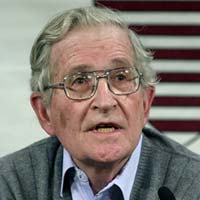The year 2012 was a year of political skullduggery with the majority of leadership cutting across political ideologies in Jammu and Kashmir playing the same old cards and using every opportunity to stay relevant to the politics, Shah Abbas reports.
As They Said…
“There are a couple of major problems that need to be dealt with. One of them, of course, is Kashmir. The question is, can they figure out a joint solution to the Kashmir conflict?”
Noam Chomasky, an American political critic while talking about India- Pakistan relations in an interview with Micheal Shank.
Once again, this year was largely a turn-off on political front for the state of Jammu and Kashmir. During 2012, Hurriyat (G) chairman, Syed Ali Geelani, remained in captivity for 177 days out of 280 days he spent in Srinagar. The state, it seems, is scared of 83-year-old man surviving on a single kidney.
 Delhi tried its best to do an image makeover in Kashmir valley. Sushil Kumar Shinde became the first union home minister in 22 years to drive through Lal Chowk. He interacted with people and enjoyed ice-cream at a local shop. However, this led to calls for the revocation of AFPSA from areas where army was not required to operate. Shinde, however, quickly dismissed any such hopes. Perhaps he forgot to mention the make-up kit. So much for peace!
Delhi tried its best to do an image makeover in Kashmir valley. Sushil Kumar Shinde became the first union home minister in 22 years to drive through Lal Chowk. He interacted with people and enjoyed ice-cream at a local shop. However, this led to calls for the revocation of AFPSA from areas where army was not required to operate. Shinde, however, quickly dismissed any such hopes. Perhaps he forgot to mention the make-up kit. So much for peace!
The tussle between the armed forces and Chief minister Omar Abdullah over revocation of the draconian AFPSA from the state in many ways showed who rules the state. Abandoned by Delhi, Omar publicly accused armed forces of scuttling AFPSA revocation, although he kept talking vibrantly about the settlement of Kashmir issue.
If Shahrukh Khan’s Srinagar visit, the revival of late night baraats, visit of more than 16 lakh tourists, arresting even girls and continuing ban on Moharrum and Eid-e-Milad processions are ‘signs of normalcy’, then the state had a peaceful year. But the security of over 17,000 Panchs and Sarpanchs was a big talking point ever since the process for electing the representatives of Panchayati raj took place. Despite a boycott call issued by Syed Ali Geelani, a record 90 percent voter turnout was seen. A time for introspection, it seems.
On a domestic front, this year witnessed a repeated war of words between National Conference leader, Dr Mustafa Kamal, the foot-in-mouth uncle of Omar Abdullah, and the state congress. Many a times, Kamal called the state congress leaders as ‘Gandi Nali Kay Keeday’, the term Sheikh Mohammad Abdullah had used for the Congressmen in his life time.
But the coalition with ‘Gandi Nali Kay Keeday’ seems ‘natural’ to chief minister Omar Abdullah, who hinted a pre-poll alliance with Congress for 2014 assembly elections. National Conference and Congress – the partners in the ruling coalition – seemed to be at loggerheads over the implementation of 73rd and 74th amendments of the Constitution in the state. But finally, a lot of public posturing took place which proved fruitful as the coalition candidates captured all the four seats of LC reserved for the Panchayati raj representatives.
Omar Abdullah announced the setting up of National Conference Student Union (NCSU) giving some restless time to the pro-freedom leaders who are dominating the student fraternity, since the student union activities are banned in educational institutes in Kashmir.
This year saw emergence of Desi-BJP when, in an unusual fashion, three youth – Manish Khajuria, Sunny Malhotra and Ambedkar Gupta – jumped into the well of the state legislature waving flags and shouting slogans demanding implementation of employment policy. When they left, the trio were accorded a warm welcome in Jammu as if they had successfully barged into the enemy’s territory and returned unhurt. They were given passes on the request of expelled BJP lawmaker Jagdish Raj Sapolia and the flags waved by them belonged to Jammu and Kashmir Democratic Front (JKDF), a new political party floated by Sapolia.
The executive leaders of Hurriyat (M) except Shabir Ahmad Shah, had a much publicized visit to Pakistan where they advocated that Kashmiris should avail the ‘benefit’ of ‘concessions’ India was ready to give them. Professor Abdul Gani Bhat, one of the delegation members, said at a function organized by Institute of Strategic Studies, Islamabad (ISSI), “India, in bid to sustain its growth, may offer concessions and we must seize them.”
Earlier, Hurriyat (M) leaders had a ‘public quarrel’ in Rajbagh when Prof Bhat called the UN resolutions about Kashmir ‘impracticable’. It was again Shabir Shah who took the front against Bhat along with Nayeem Khan but Azam Inquilabi lonely had to ‘bear the fruits’ of the issue by leaving the amalgam.
Independent lawmaker Er Rasheed also remained in focus for the whole year. Enjoying the mainstream platform, MLA Langate left no stone unturned in promoting pro-freedom agenda. Whether it was the issue of Afzal Guru, human rights or other hot topics, Er Rasheed wasted no second to seize the opportunity.
















